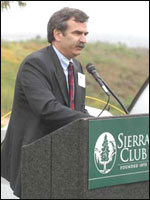If the Democratic primaries have proven a little prim and polite for your taste, there’s another upcoming election that may pique your interest. This one is loaded with bitter controversy, nasty accusations, and emotional appeals to democracy and fairness. Its major players have even taken their grievances to court — all before the nearly three-quarters of a million potential voters have gotten a peek at their ballots.

Crowd and clear?
What’s at stake in this mudslinging contest? Five seats on the national board of the Sierra Club, the oldest, largest, and some might say most widely respected environmental organization in the country.
Board elections are a longstanding annual tradition for Sierra Club members. Ever since John Muir and a few dozen of his fellow hikers drew up the group’s first bylaws back in 1892, members have chosen directors to help set the organization’s agenda. This year, that time-honored routine is anything but routine — some say the April ballot count could threaten the very future of the group.
“We stand to lose the Sierra Club as we know it,” says Lawrence Downing, a former Sierra Club board president and a spokesperson for the recently organized election-watchdog group Groundswell Sierra.
Immigration Conflagration
Exactly where this tangled tale begins depends on whom you ask, but let’s start in the spring of 1998. That’s when the Sierra Club membership voted to take “no position” on U.S. immigration policy. Though the Sierra Club had never explicitly supported restrictions on immigration, in 1969 its board had called for stabilization of the population of the United States as part of a broader policy on global population growth. In 1978, the board also urged Congress to study the effects of immigration on domestic population growth and environmental quality.
The 1998 neutrality policy, supported by about 60 percent of the members who voted, favored a “comprehensive approach” to population growth and mass migration that would promote reproductive health, women’s rights, and economic security throughout the world.
The Sierra Club population program, established in the 1970s, now focuses on domestic and international family planning. Sierra Club Executive Director Carl Pope adds that the group’s work on international trade reform, human rights, and sustainable development tackles the root causes of human migration. “Limiting immigration is just a way of dealing with the symptoms,” he says. Groups such as the National Audubon Society and the National Wildlife Federation have taken similarly international approaches to population growth.
But the 1998 neutrality vote didn’t end the Sierra Club debate over U.S. immigration policy. Some members, loosely organized under the name Sierrans for U.S. Population Stabilization (now known as SUSPS), have pushed for more concerted action. They point out that U.S. residents consume far more resources per person than people living in the rest of the world. Restrictions on immigration, they say, have the straightforward effect of limiting the number of such resource hogs. And if U.S. environmentalists hope to slow sprawl and protect wild spaces, SUSPS contends, they simply cannot afford to ignore immigration and its impact on U.S. population.

Ben Zuckerman.
SUSPS supporters also contend that the 1998 ballot on immigration policy violated Sierra Club bylaws, presenting voters with two competing alternatives rather than the required yes-or-no question. “People like myself just want there to be a fair membership vote,” says Ben Zuckerman, a SUSPS cofounder and professor of physics and astronomy at the University of California-Los Angeles.
Such dissatisfaction gained greater visibility within the Sierra Club in 2002, when Zuckerman was elected to the 15-member national board. Last year, the membership elected two more SUSPS-endorsed candidates, Wisconsin Secretary of State Doug LaFollette (D) and Paul Watson, founder and president of the Sea Shepherd Conservation Society. Zuckerman, LaFollette, and Watson all ran as “petition candidates,” meaning they were not nominated by the existing Sierra Club board but instead collected the approximately 360 signatures required to place themselves on the ballot.
A handful of new likeminded petition candidates are on the 2004 ballot. They include Richard Lamm, former Democratic governor of Colorado; David Pimentel, a Cornell University ecologist; and Frank Morris, former executive director of the Congressional Black Caucus Foundation. The three have little or no experience as Sierra Club members or activists.

Frank Morris.
Though their official ballot statements have not yet been released, all three have stated their support for reducing U.S. immigration levels and are active in immigration-reduction organizations. For instance, Lamm and Morris are both on the board of the California-based Diversity Alliance for a Sustainable America, which backs lower immigration numbers; Pimentel formerly served on the DASA advisory board. SUSPS helped all three candidates gather signatures, and Morris says that current board member Zuckerman encouraged him to run. However, the candidates have repeatedly stated that they are running independently of one another. Lamm says emphatically that he is not “part of a slate,” but simply interested in getting immigration on the Sierra Club agenda.
It didn’t take long for the situation to get ugly. Several anti-immigrant and white-supremacist groups got word of the upcoming elections and urged their supporters to join the Sierra Club in time to vote for the three candidates. In late October, the Southern Poverty Law Center, which monitors hate groups, sent a detailed letter to Sierra Club Board President Larry Fahn describing the recent activities of anti-immigration activist John Tanton, who has repeatedly called for the Sierra Club to support stricter immigration limits. Tanton is associated with several organizations that the law center defines as hate groups. “Without a doubt,” wrote law center staffer Mark Potok, “the Sierra Club is the subject of a hostile takeover attempt by forces allied with Tanton and a variety of right-wing extremists.”
Sierra Club board member Zuckerman has questioned the accuracy of the law center’s research; in an email to his fellow board members, he called Tanton “a great environmentalist” and an “intelligent and courageous human being.” When asked about these comments, Zuckerman said he does not know Tanton well and does not have detailed knowledge of his views. “But when he talks about the environment and U.S. population growth,” he says, “he makes a lot of sense.”
The board candidates, for their part, have vociferously denied any ties to hate groups. “I’m being accused of being a racist, which is about the worst thing you can say in this society,” says Lamm. “I’m deeply resentful about that.”

Larry Fahn.
For Letter or for Worse
These developments got the attention of 13 former Sierra Club board presidents, who signed a strongly worded letter that was sent to Fahn, the current president, in mid-January. “There is now in place an organized effort to elect directors of the Sierra Club from outside the activist ranks of Sierra Club members,” they wrote. “You must use all of the resources of the Sierra Club that are legally available to protect the organization.”
The presidents’ letter pointed to a recent statement by Sierra Club board member Watson, who told an audience of animal-rights activists that they were only “three directors away from controlling that [Sierra Club] board.” Though Watson was referring to an anti-hunting and anti-trapping agenda, not population and immigration, his widely quoted comments caused consternation among many Sierra Club members and helped convince the former presidents to act.
“This is a clear takeover by outside organizations,” says Alejandro Queral, a Sierra Club volunteer and native of Mexico who has been active in environmental issues along the U.S.-Mexico border. “It’s a very dangerous precedent, and it’s going to send the message to the Latino community that we are not an inclusive organization.”

David Pimentel.
“If [Lamm, Pimentel, and Morris] are elected, there won’t be a recovery from this in my lifetime,” says former board president Downing. “This will immediately divide the membership — we’ll be perceived as a fringe group.”
In response to such concerns, the board approved an “Urgent Election Notice” that will be attached to the 2004 ballot when it is mailed this week. The notice lists the websites of organizations — including white-supremacist groups — that have taken an interest in the upcoming elections, stating that “it appears that non-environmental groups are trying to take advantage of the Club’s open and democratic nature to influence the composition of our board of directors and our policies … Please cast your vote in this year’s election as a means of demonstrating to outside groups that they cannot influence our organization.”
The board was split on this unusual move. “There are a lot of good candidates running, and I think the members are smart enough to figure what’s good for the organization,” says Marcia Hanscom, one of five board members who voted against issuing the election notice.

Richard Lamm.
On Feb. 9, Lamm, Pimentel, and Morris filed suit in the San Francisco Superior Court, charging that the Sierra Club, Executive Director Pope, and Board President Fahn were violating state law by using organization funds to influence the outcome of the election. They also called for the withdrawal of three other candidates who plan to use their ballot statements simply to call for the defeat of Lamm, Pimentel, and Morris. Among them is Southern Poverty Law Center cofounder Morris Dees, whose statement, now posted on the SPLC website, urges club members to “vote against the ‘greening of hate’ and against those candidates backed by SUSPS.”
Lamm, Pimentel, and Morris withdrew their lawsuit the following week, after the Sierra Club, Pope, and Fahn filed a motion to dismiss the suit and recoup their attorneys’ fees.
Sierrelevance
For now, this shouting match is drowning out any real discussion of the central issue: Do U.S. immigration limits have a valid role to play in environmentalists’ efforts to rein in population growth? Whatever the outcome of the board elections, the Sierra Club is certain to face this question again in the future; the current board has already agreed to another membership vote on U.S. immigration policy in 2005.
Thoughtful debate may not be the only victim of the uproar. “This controversy is clearly an enormous distraction from the biggest challenge the Sierra Club has ever faced, and that’s stopping the environmental assault of the Bush administration,” says Pope. “I think it’s very sad.”
Lamm, who says the 2004 presidential election would be one of his priorities as a board member, concedes that Pope might be right: The controversy could dilute the Sierra Club’s influence on presidential politics. “I didn’t mean it that way when I started down this road, and I don’t take all the blame for it, but I agree,” says Lamm. “It’s a damn shame.”




